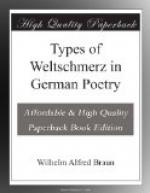[Footnote 39: Werke, Vol. II, p. 189.]
[Footnote 40: Cf. op. cit., p. 352.]
[Footnote 41: Werke, Vol. I, p. 51.]
[Footnote 42: Werke, Vol. I, p. 50.]
[Footnote 43: Werke, Vol. I, p. 49.]
[Footnote 44: Werke, Vol. I, p. 66.]
[Footnote 45: Werke, Vol. I, p. 165.]
[Footnote 46: Werke, Vol. II, p. 198.]
[Footnote 47: Werke, Vol. II, p. 97.]
[Footnote 48: Werke, Vol. II, p. 200.]
[Footnote 49: Werke, Vol. II, p. 200 f.]
[Footnote 50: Werke, Vol. I, p. 105.]
[Footnote 51: Werke, Vol. I, p. 196.]
[Footnote 52: Werke, Vol. I, p. 214.]
[Footnote 53: Werke, Vol. I.]
[Footnote 54: Werke, Vol. I, p. 234.]
[Footnote 55: “An die Nachtigall,” “An meinen Bilfinger,” Werke, Vol. I, p. 42f.]
[Footnote 56: Werke, Vol. I, p. 43.]
[Footnote 57: Werke, Vol. I, p. 197.]
[Footnote 58: Briefe, p. 160.]
[Footnote 59: Briefe, p. 162.]
[Footnote 60: Cf. supra, p. 22.]
[Footnote 61: “Oedipus Coloneus,” 1225 seq.]
[Footnote 62: Werke, Vol. II, p. 81.]
[Footnote 63: Cf. Introduction, p. 1 f.]
[Footnote 64: Werke, Vol. I, p. 89.]
[Footnote 65: Briefe, p. 382 f.]
[Footnote 66: Briefe, p. 403-405.]
[Footnote 67: Werke, Vol. II, p. 175.]
[Footnote 68: Briefe, p. 404.]
[Footnote 69: Werke, Vol. II, p. 68.]
[Footnote 70: Werke, Vol. II, p. 100.]
[Footnote 71: Werke, Vol. II, p. 68.]
[Footnote 72: Werke, Vol. II, p. 85.]
[Footnote 73: Werke, Vol. II, p. 181.]
[Footnote 74: Werke, Vol. I, p. 253.]
CHAPTER III
=Lenau=
If Hoelderlin’s Weltschmerz has been fittingly characterized as idealistic, Lenau’s on the other hand may appropriately be termed the naturalistic type. He is par excellence the “Pathetiker” of Weltschmerz.
Without presuming even to attempt a final solution of a problem of pathology concerning which specialists have failed to agree, there seems to be sufficient circumstantial as well as direct evidence to warrant the assumption that Lenau’s case presents an instance of hereditary taint. Notwithstanding the fact that Dr. Karl Weiler[75] discredits the idea of “erbliche Belastung” and calls heredity “den vielgerittenen Verlegenheitsgaul,” the conclusion forces itself upon us that if the theory has any scientific value whatsoever, no more plausible instance of it could be found than the one under consideration. The poet’s great-grandfather and grandfather had been officers in the Austrian army, the latter with some considerable distinction. Of his five children, only Franz, the poet’s father, survived.




